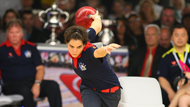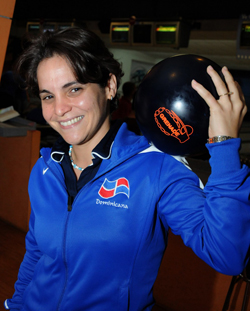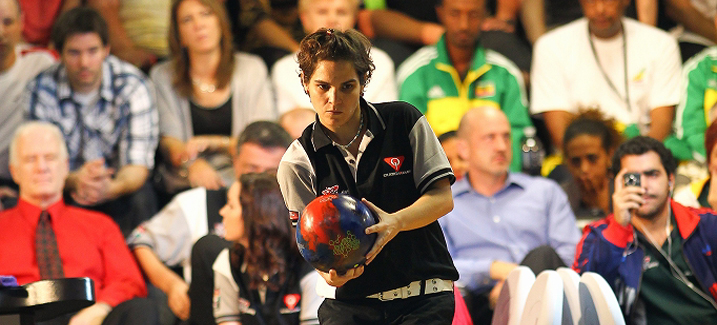2012 Queens profiles: Aumi Guerra
April 13, 2012

Register now for the 2012 USBC Queens
 Most competitive bowlers dream of winning. But when you come from a place where there are 46 bowling lanes in the entire country, your monthly income amounts to $350, and you happen to be one of the top female bowlers in the world, what do you allow yourself to dream?
Most competitive bowlers dream of winning. But when you come from a place where there are 46 bowling lanes in the entire country, your monthly income amounts to $350, and you happen to be one of the top female bowlers in the world, what do you allow yourself to dream?That is the question Aumi Guerra faces every day. Guerra lives in the Dominican Republic, “a small country in the middle of the Caribbean known for rum and baseball players,” as she puts it. She gets two paychecks a month from the government—a $200 check for being a sergeant major in the military, and a $150 check for being a high-performance athlete. Thanks to an apartment given to her by her parents, she gets to live without worrying about rent, at least for the time being.
And when she shoes up to bowl the USBC Queens this year, she will be doing so on a credit card. The same credit card she used to cover expenses while in Madrid, Spain, for the Ibero-American Championships last month, where she became the first woman to bowl 300 in the history of the bowling center and dominated all individual events, winning gold in singles, masters and all-events.
Guerra started bowling on wood lanes topped with Guardian. She found lanes wherever she could, like basements in parts of town where you knew better than to show up by yourself.
“It was pretty rough,” Guerra explains. “If you went there, you had to go with a couple guys because it was a rough place. Before that, we had a bowling center back in the ‘70s that was very underground, just a couple of lanes.”
You may not have heard of Aumi Guerra, but you have heard of the players who will never forget her. Players such as PBA stars Tommy Jones and Jason Belmonte, who grappled for the right to call themselves the highest qualifier among all players—man or woman—at the 2011 QubicaAMF World Cup, only to find themselves trying to catch Guerra.
“That was so much fun, man!” Guerra says. “I mean, come on! I was beating Tommy Jones! It was just a lot of fun."
Guerra set the record for the highest five-game block by a woman in the nearly 50-year-history of the event, shooting 1,304 for a 260 average with scores of 278, 234, 267, 246 and 279. At one point in the tournament, she held a 549-pin lead over fourth place, and out-averaged her next closest competitor by nearly 30 pins.
“I have seen Aumi develop as a bowler for about the past ten years, and at first, she really had a long way to go,” recalls 14-time Team USA member, Diandra Asbaty, whom Guerra narrowly defeated for the 2011 World Cup title. “But she has worked really hard on her game to get it to where she can really compete. She’s probably always been one of the best in the Dominican Republic, but to compete on an international level is something else altogether.”
Guerra’s 2011 win made her one of just two players to defend a World Cup title—she had won the event in 2010 when it was contested in Toulon, France—something that had not been done in nearly 30 years. That 2010 win was the Dominican Republic’s first World Cup title.
“I’ve seen players in the zone before, but not for days,” Team USA head coach Rod Ross says of Guerra’s performance at that event. “She came to the World Cup on a mission. She wanted to repeat, and she made sure she was prepared this time, and it definitely showed. It was very impressive.”
Another player who will never forget Guerra’s name is reigning USBC Queens champion Missy Parkin, who defeated Guerra in the opening round of match play at last year’s Queens, 678-676, in a match she describes as “insanely intense.”
“That was by far the toughest match I faced en route to my Queens victory,” Parkin says. “I should have been knocked into the contenders’ bracket during the first round. She basically was absolutely killing me going into the final game of the match. I was down by about 70 pins, and then I proceeded to throw the front nine in the final game, but it was still super close going into the 10th frame. I think anyone who saw that match would remember it.”
Missy Parkin. Tommy Jones. Jason Belmonte. These are the kind of players who dream of winning. But when you are Aumi Guerra, dreams only go as far as your credit limit allows, and they just as easily can be a way to taunt yourself as they may be a source of motivation.

“Dave Chappelle has a skit about keeping it real,” Guerra explains. “Well, I come from a place that keeps it real. You ask me if I want to win? Actually, I just want to have the chance to compete. It’s not a matter of what I want to do; it’s a matter of what I can do. It’s a matter of getting sponsors, and I am geographically challenged because of where I come from. Just trying to get to a tournament is hard enough for me.”
If the dreams players like Parkin or Belmonte entertain are things Guerra has learned to keep in check, expectations are things she has learned to avoid altogether.
“I think that a lot of human suffering comes from expectations,” Guerra explains. “If I go to the Queens and I expect to win, oh, man, am I in for some sorrow and sadness. I will go to the Queens expecting to enjoy my time there and learn and take whatever comes my way, no matter what happens. Expectations really mess things up for people. As soon as I put those away and just focused on the experience and being in the moment, that’s when I started winning.”
It all sounds so easy now, but as Guerra’s longtime coach Craig Woodhouse explains, that perspective has not come without pain.
“I can remember we went to the World Ranking Masters in Russia about four or five years ago, and Aumi went there with all these hopes and expectations, and it was not a good tournament for her and she took it very hard. It was really rough on her. What she does now is she tries to take each tournament more lightly and really look at it for what it is, whereas before, it was ‘If I don’t win, I am a failure.’”
The Aumi Guerra who shows up to bowl the Queens this year will be the one who left those expectations behind long ago, the one who knows she cannot always expect even to find a way to get to the tournament, no less win it. And she will be bowling against ladies for whom getting to the tournament is an afterthought and winning is the goal.
“Aumi only gets to bowl a handful of tournaments a year, and that’s one of the really big disadvantages,” Woodhouse explains. “The girls in the U.S. are bowling something almost every weekend, but Aumi gets a tournament every two months or so. She practices and trains all the time, but I always say that the best way to prepare for a tournament is to bowl another tournament, and she doesn’t really get that opportunity too often.”
Every tournament Guerra bowls is an opportunity she never could have allowed herself to hope for; just making it to the bowling center—whether it is in France, Spain, Russia or the United States—is a victory in itself. Anything that happens after that? Well, that’s the part Guerra describes as “so much fun.”
Still, it is hard not to dream a little after pacing the men’s field at an event like the World Cup.
“When I started traveling to the U.S., I wanted to be on ESPN, and then I went to bowl the PBA Women’s Series and I found out how good these ladies are,” Guerra says. “But I think seeing me bowl on TV at the Queens would show people back home that I have become a very competitive athlete.”
But to people who have seen her bowl away from home, and especially those who have found themselves on the bad end of a match against her over the past few years, Aumi Guerra has very little left to prove.





